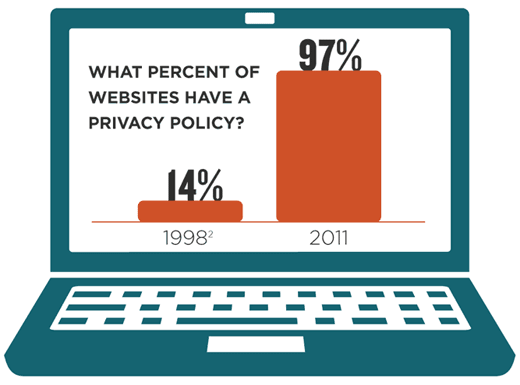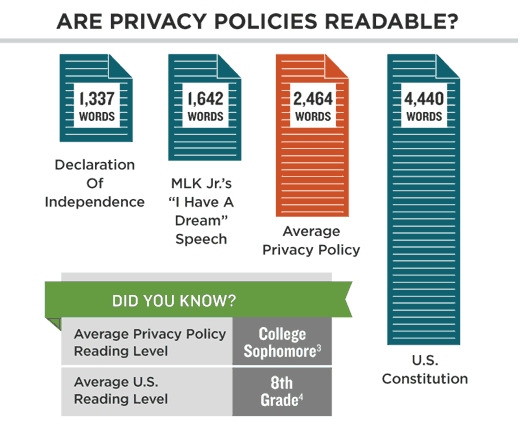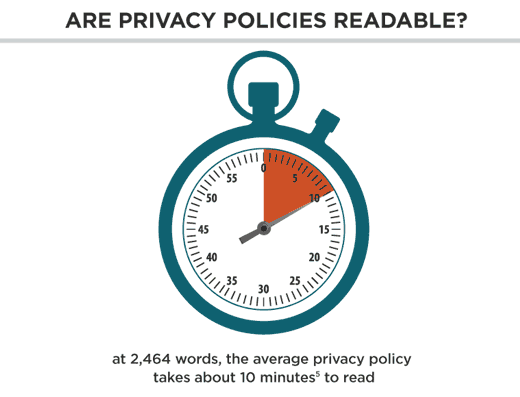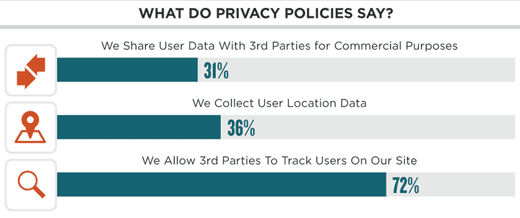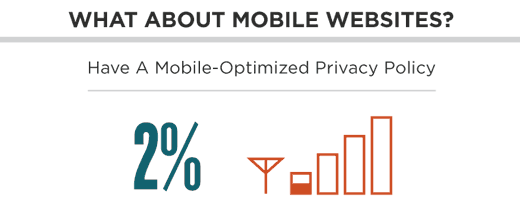TRUSTe, a leading online privacy solutions provider, recently released its first privacy index as part of its new “Privacy Pulse” information series tracking changes and trends in online privacy. In the 2011 website edition of its privacy index, TRUSTe analyzed the privacy policies of the top 100 U.S. websites (as ranked by Alexa Sept. 2011) to evaluate privacy practices by measuring key policy attributes, as well as the type of disclosures contained in them. TRUSTe found that while nearly 100 percent of websites today include a privacy policy, existing policies are highly complex, lengthy and written in language that is confusing for the average person to understand. Additionally, the vast majority of privacy policies are not readily transparent regarding third-party usage of data or consumer choices.
“Clearly, more work needs to be done to deliver shorter, more accessible privacy policies that can be quickly and easily understood by consumers, so that they have the ability to make choices regarding the sharing of their personal information,” said Chris Babel, CEO of TRUSTe. “By releasing this first privacy index and launching our new ‘Privacy Pulse’ information series, TRUSTe is dedicating its substantial expertise and resources to further educate the market about responsible online privacy practices — including privacy policies. We believe that this open approach brings tremendous value by identifying the changes that are needed to provide more transparency and build online trust. This, in turn, paves the way for the successful implementation of new and innovative online technologies.”
Click through for findings from TRUSTe’s first privacy index focusing on online privacy.
Ninety-seven percent of the websites analyzed have a privacy policy, compared with a national average of 14 percent in 1998 (Privacy Online: A Report to Congress, Federal Trade Commission, 1998).
The 2011 Website Edition reveals that the typical privacy policy is written six grade levels higher than the average U.S. reading level of 8th grade (calculated per the Flesch-Kincaid Grade Level Readability Formula). In addition, at 2,464 words, the average privacy policy is almost twice as long as the Declaration of Independence and one and a half times as long as Martin Luther King’s “I Have a Dream” speech.
The average privacy policy takes approximately 10 minutes to read at a 250 wpm comprehension. Written in this complicated and lengthy form, most online privacy policies are not easily interpreted by the majority of consumers, limiting their understanding of how personal data will be used and the choices that are available to them.
In addition, because disclosures are not clear and readily transparent, most consumers do not fully understand that when they visit one site, another company can be tracking their behavior, and yet another company might be receiving a copy of the data they entered.
The privacy index findings include current online trends, such as:
- 72 percent of the websites analyzed say that they allow third-party tracking on their sites;
- 36 percent say that they collect users’ location data; and
- 31 percent say that they share user-provided data with third parties.
However, in regards to consumer disclosures, many websites still fall short:
- 93 percent of the websites do not disclose how long they keep customer data on file; and
- 68 percent do not explain how a user can delete an account.
Out of the 100 websites analyzed, only a miniscule two percent have a mobile-optimized privacy policy. Yet, according to TRUSTe’s 2011 Mobile Privacy Survey conducted by Harris Interactive, privacy is the number one consumer concern when using mobile applications on smartphones.



